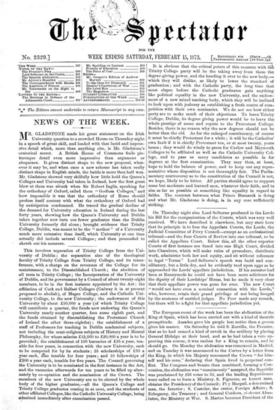On Thursday night also Lord Selborne produced in the Lords
his Bill for the reorganisation of the Courts, which was very well received. We have described it elsewhere, but may state here that its principle is to fuse the Appellate Courts, the Lords, the Judicial Committee of Privy Council—except as an ecclesiastical tribunal—and the four Courts of Review into one tribunal, to be called the Appellate Court. Below this, all the other superior Courts of first instance are fused into one High Court, divided into Chambers, which will make rules of procedure, distribute work, administer both law and equity, and sit without reference to legal "Terms." Lord Selborne's speech was lucid and con- cilitatory, but a little dry, and he evidently trod upon eggs as he approached the Lords' appellate jurisdiction. If his ancestor had been at Runnymede he could not have been more solicitous for the dignity of their Lordships' House, but he made it very clear that their appellate power was gone for ever. The new Court "would not have even a nominal connection with the Lords," who, however, retain their grand privilege of not being hanged by the sentence of untitled judges. No Peer made any remark, but there will be a fight for that appellate jurisdiction yet.


































